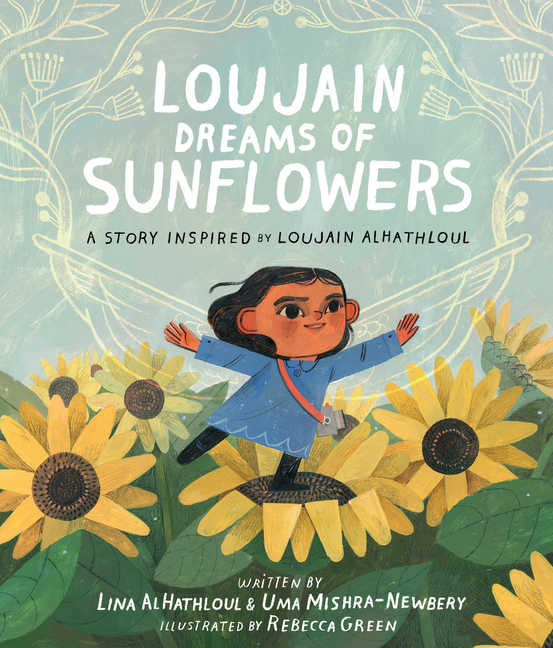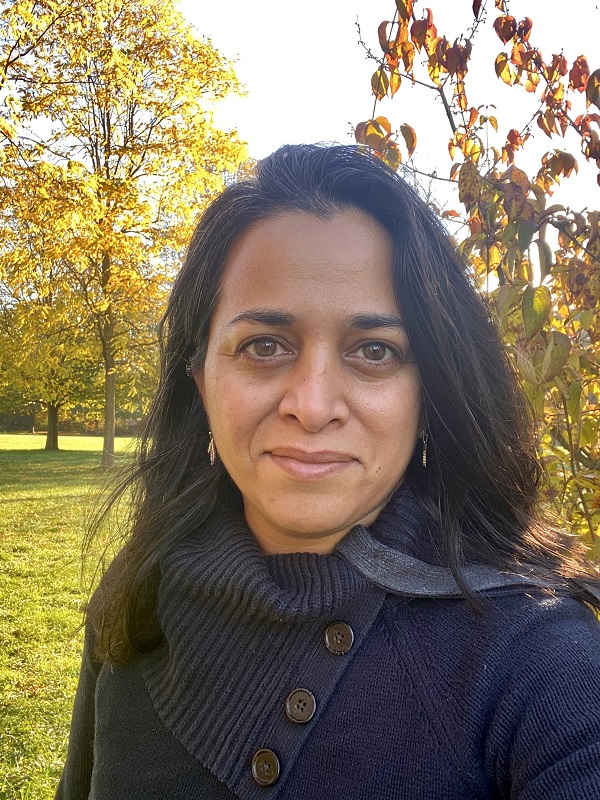Meet-the-Author Recording with Uma Mishra-Newbery and Lina AlHathloul
Loujain Dreams of Sunflowers |
Uma Mishra-Newbery and Lina AlHathloul introduce and share some of the backstory for creating Loujain Dreams of Sunflowers.
Translate this transcript in the header View this transcript Dark mode on/off
Uma Mishra-Newbery: Hi. My name is Uma Mishra-Newberry, and I am the co-author of Loujain Dreams of Sunflowers, a story inspired by Loujain Al-Hathloul.
Lina Al-Hathloul: Hi, I'm Lina Al-Hathloul. I'm the co-author of Loujain Dreams of Sunflowers, and I'm also the sister of Loujain.
Rebecca Green: Hi, I am Rebecca Green and I am the illustrator of Loujain Dreams of Sunflowers.
Lina Al-Hathloul: I'm Lina Al-Hathloul. I'm the youngest sister of Loujain Al-Hathloul. My sister is a woman's rights activist in Saudi Arabia, and because of her activism, she was arrested and imprisoned for almost three years. I have been advocating for my sister's release from the beginning, I would say. We had to be creative in how to get her name in the public sphere for people to know her and to advocate with us. And during this tough journey, I met Uma, who wanted me to speak at the Human Rights Council. She then became a great friend, my number one supporter, and we've been through a lot together. And during one of the days where we were together, I met her daughter, Lila, who was asking a lot of questions about Loujain and that's when Uma, as a mother, had this idea of inspiring little girls, so I'll just let her speak more about this.
Uma Mishra-Newbery: When my daughter met Lina, my daughter at that time was five years old, and she was asking me lots of questions about Loujain, and questions that I didn't really know, as a parent, how to answer because Loujain's story is quite an intense one. And when I floated the idea of writing this children's book to Lina, Loujain was still in prison at that time, so we couldn't ask Loujain, for example, if sunflowers were even her favorite flower. There were so many things in the process of writing this book that we had to really think about and contend with, but the ultimate goal that Lina and I had and wanted to really convey is that Loujain's story needed to be heard in as many different places as possible.
And the stories of human rights defenders and activists that are working consistently every single day on the front lines to affect this level of change, their stories need to be heard not after they've had passed away or not after they've perished in prison, but when they're still living, so we can celebrate them. There was an immense amount of care and attention we paid to every single word when we were writing this book, and that same level of care and attention needed to come through as well in the illustrations, so it was my immense pleasure and with a huge amount of excitement that a person whose art I've admired for over ten years and is a friend was able to join us for this journey. With that, I'm going to turn it over to Rebecca.
Rebecca Green: Thank you so much, Uma and Lina. As Uma said, we have known each other for over a decade and have been friends, so of course, when she came to me with this picture book, I was elated and also took the responsibility of this book very seriously. This book was a little different. Usually, I don't ever work that closely with authors, but knowing Uma and Lina, there was a sensitivity to the information about Loujain's case, especially because it's active, all of the resources that I need to look through to bring the story to life. So I said yes and started doing a lot of research. I'd never been to Saudi Arabia, so I had to research the different art there, the landscapes. I watched movies to try to get a sense of it. The one thing about this book is that it is based on Loujain, but it's also a very magical book. Loujain flies and she has wings and it's fiction on a certain level too, so that there was room for interpretation in the illustrations. And that was, of course, really fun for me. I got to bring this real world figure, Loujain, and her family to life, but in a really magical way.
Lina Al-Hathloul: I would say the thing I'm most proud of is to really bring a story of the hero she is because often, some media would, of course she was in prison and she was sometimes portrayed as a victim, as well, of the regime. But I think that it is needed to hear that she's first and most a hero. And I think that with this book, we found the right language with the right pictures, the right wording for her story to be brought to the public truthfully, I would say, as a hero, someone who has never given up and as someone who has really fought for justice. I think that's the thing I'm most proud of is I am sure it will inspire people, and she will be an example for women's rights movement for a very long time.
Rebecca Green: I think, for me, the thing that I'm most proud of and really tried to balance in this book, and it's rooted in real life, and it's inspired by Loujain and her story and her fight, and it's also a fictional story and it has immense imagination and details about color, so the shapes, the color, the environment, all of those were important. And for me, it was a really fun, but also, I guess, just welcome challenge, trying to balance the reality of the situation. It is a very heavy story and a serious situation which is happening. Also, there's just so much joy in the book when she learns to fly, and she's free, and she goes to this field of sunflowers. So there was a balance between keeping the book grounded, and then also having it be this very imaginative, colorful, lively piece.
Uma Mishra-Newbery: My hope for people that will read this book, whether it be parents or educators or young kids, is to understand that Loujain's story is not an isolated story. There are many, many, many people like Loujain that are fighting so dearly and paying such a heavy price for our collective rights. To young kids who are reading this, I want them to know that their voice is as important as ever, and their dreams are as important as ever, and they have every right to speak out against any injustice that they face.
Lina Al-Hathloul: More than it being a beautiful story, it's also very inspiring, and I hope that people will be inspired by Loujain as much as I have been and realize that one person can actually change things. I think we haven't said it at all now, but the story is an analogy of Loujain's fight to drive a car in Saudi Arabia and she won, actually. And at the end, also, in this picture's book, the little Loujain wins also her fight. I think it's important for parents to also believe in their kids' dreams, to encourage them to pursue them and also for kids to know that they can look upon real examples of real stories and to believe that when they see injustices, they can change them all while being kids and dreaming. And this is why I think it's a such an important story and a very, very inspiring one.
This Meet-the-Author Recording with Uma Mishra-Newbery and Lina AlHathloul was exclusively created in March 2022 by TeachingBooks with thanks to minedition.




